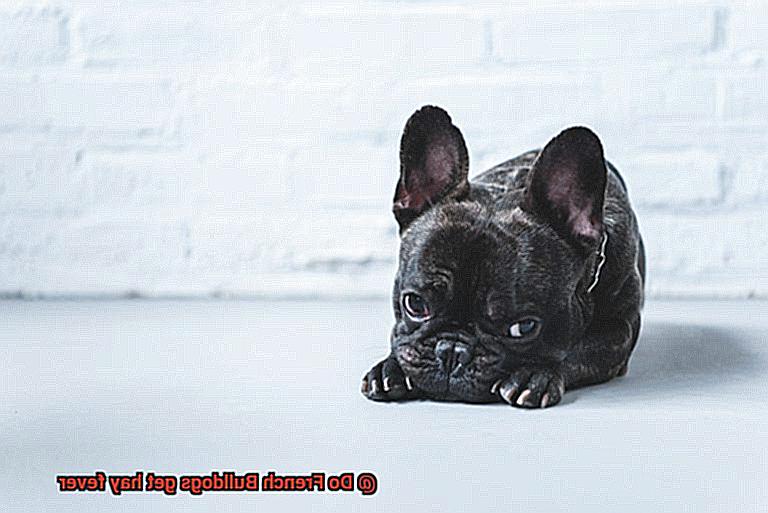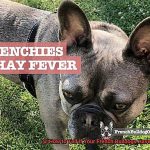Do French Bulldogs get hay fever?
Do you have a French Bulldog that seems to be suffering from sneezing, itching, or watery eyes? As a pet owner, it’s natural to worry about your furry friend’s health and wonder if they’re experiencing hay fever.
After all, French Bulldogs are known for their charming personalities and affectionate nature, but they also come with their own set of health challenges. In this post, we’ll explore everything you need to know about hay fever in Frenchies.
We’ll delve into the causes, symptoms, and management strategies of this common allergy that affects many dogs. So whether you’re a seasoned Frenchie owner or considering getting one in the future, keep reading to discover how to keep your pup healthy and happy.
French Bulldogs are adorable creatures that can quickly steal your heart with their playful antics and snuggly nature. However, as much as we love them, it’s essential to understand the potential health issues that come with owning one.
One of these concerns is hay fever – an allergic reaction that can cause uncomfortable symptoms like sneezing and itching. But don’t worry – we’ve got you covered.
Common Symptoms of Hay Fever in French Bulldogs
Contents
- 1 Common Symptoms of Hay Fever in French Bulldogs
- 2 Diagnosing and Treating Hay Fever in French Bulldogs
- 3 Genetic Factors That Increase the Risk of Hay Fever in French Bulldogs
- 4 Environmental Factors That Increase the Risk of Hay Fever in French Bulldogs
- 5 Preventive Measures to Reduce the Risk of Hay Fever in French Bulldogs
- 6 The Impact of Hay Fever on a Frenchie’s Quality of Life
- 7 Conclusion
Hay fever is a common allergy that can affect French Bulldogs, causing discomfort and irritation.
As a loving pet parent, it’s essential to recognize the symptoms of hay fever and take your furry friend to the vet for diagnosis and treatment. One of the most common signs of hay fever in French Bulldogs is sneezing and a runny nose.
If you notice your Frenchie frequently sneezing and having a runny nose, it could be a sign of hay fever. Additionally, dogs with hay fever may feel itchy, leading them to scratch excessively, which can cause skin irritation and infection.
Another symptom of hay fever in French Bulldogs is watery eyes. Your Frenchie may have trouble opening their eyes and exhibit signs of discomfort.
In severe cases, hay fever can cause coughing and wheezing, making breathing difficult for your furry friend. Hay fever can also lead to ear infections in dogs, causing pain and discomfort.
Keep an eye out for your Frenchie scratching their ears frequently or shaking their head excessively, which are signs of ear infections. It’s important to note that not all French Bulldogs are affected by hay fever, but it’s always best to take precautions to prevent allergies.
You can reduce the risk of allergies by keeping your Frenchie’s environment clean and free of allergens, providing hypoallergenic bedding and food, and taking them for regular check-ups with a veterinarian. In conclusion, recognizing the symptoms of hay fever in French Bulldogs early is crucial for proper diagnosis and treatment.
Diagnosing and Treating Hay Fever in French Bulldogs
Allergies can lead to a range of symptoms in Frenchies, including itchy skin, sneezing, runny nose, and breathing difficulties. However, the good news is that hay fever in French Bulldogs can be effectively managed with proper diagnosis and treatment.
The first step to diagnosing hay fever in French Bulldogs is recognizing the symptoms. These symptoms are similar to those seen in humans, such as watery eyes, itching, sneezing, and a runny nose.
If you suspect your Frenchie has hay fever, consulting with a veterinarian is crucial. The vet will likely conduct skin or blood tests to identify the specific allergen causing the allergy.
Once the allergen is identified, minimizing your Frenchie’s exposure to it is essential. The standard treatment for hay fever in French Bulldogs usually involves antihistamines or steroids.
Antihistamines work by blocking histamines’ release that cause allergic reactions while steroids reduce inflammation caused by allergies. In some cases, immunotherapy may be recommended, which involves gradually exposing your Frenchie to small amounts of the allergen over time to build up tolerance.
Besides medication, there are proactive steps you can take at home to alleviate your French Bulldog’s allergy symptoms. Keeping your house clean and free from dust and other allergens can help reduce your furry friend’s exposure to triggers.
You can also try using air purifiers or humidifiers to improve air quality in your home and lessen allergy symptoms. In conclusion, proper diagnosis and treatment of hay fever in French Bulldogs are essential for effective management of the condition.
If you suspect that your Frenchie is suffering from allergies, consult with a veterinarian for appropriate diagnosis and treatment options.
Genetic Factors That Increase the Risk of Hay Fever in French Bulldogs
Unfortunately, hay fever is a common allergic condition that can affect even our beloved pets. But did you know that genetics play a crucial role in the development of allergies, including hay fever, in French Bulldogs?
Research has found that certain genes, such as variations of the CD14 gene, are associated with an increased risk of allergies in dogs. In fact, French Bulldogs have a higher risk of developing allergies compared to other dog breeds due to their genetics.
One reason for this increased risk is due to their physical characteristics. French Bulldogs have a flattened face and short snout, which can make breathing difficult and lead to respiratory problems.
This can increase their susceptibility to allergies, including hay fever. But genetics alone don’t tell the whole story.
French Bulldogs also have a weaker immune system compared to other dog breeds, making them more prone to infections and allergies. This is due to a high level of inbreeding, which has led to reduced genetic diversity in the breed.
Inbreeding can cause genetic defects and weaknesses, including a weakened immune system. As a French Bulldog parent, it’s important to be aware of these genetic factors and take preventative measures to effectively manage your pet’s allergies.
This includes identifying symptoms and allergens through skin or blood tests, minimizing exposure to triggers, and using antihistamines or steroids as prescribed by your vet.
Environmental Factors That Increase the Risk of Hay Fever in French Bulldogs
While genetic factors can contribute to allergies, external factors play a crucial role in triggering hay fever symptoms. One significant environmental factor that can cause hay fever in French Bulldogs is pollen.
Pollen from trees, grasses, and weeds can trigger allergic reactions in dogs, just like in humans. However, French Bulldogs are more susceptible to pollen-induced hay fever because of their flat faces.
This facial structure makes it challenging for them to filter out allergens from the air, leading to more severe symptoms. Dust mites are another environmental factor that can aggravate hay fever symptoms in French Bulldogs.
These tiny insects thrive in bedding, carpets, and upholstery and can trigger allergic reactions in dogs. Furthermore, mold spores, which are airborne fungi that thrive in damp environments, can also cause hay fever symptoms in French Bulldogs.
Cigarette smoke is another significant environmental factor that increases the risk of hay fever in French Bulldogs. Secondhand smoke can cause respiratory problems and worsen existing allergies, making it essential to keep your home smoke-free if you have a French Bulldog with hay fever.
To manage your dog’s hay fever effectively, you must identify and avoid these environmental factors. Regular cleaning and air filtration systems can help reduce allergens such as dust mites and mold spores.
Preventive Measures to Reduce the Risk of Hay Fever in French Bulldogs
With some simple steps, you can help minimize the chance of allergies in your French Bulldog.

One of the most critical preventative measures is limiting your dog’s exposure to allergens. This means keeping your home clean and dust-free, especially during allergy season.
You can use an air purifier or air conditioning to filter out pollen, dust mites, and other allergens from the air. Think of it like a protective shield that keeps the bad stuff out.
Regular grooming is also essential in preventing allergies. Frequent bathing with a gentle shampoo can remove any pollen or dust that may have settled on their coat.
Brushing their coat regularly can remove any loose hair, dirt, or debris that may be causing irritation. Another important aspect is avoiding grassy areas during peak allergy season.

Pollen counts are highest during the early morning and late afternoon, so try to limit your dog’s outdoor activities during these times. It’s like staying away from crowded places during cold and flu season – you’re less likely to catch something if you avoid the areas where it’s most prevalent.
Lastly, consider switching your French Bulldog’s diet to a hypoallergenic one. Some dogs are allergic to certain proteins found in dog food, so it’s crucial to choose a high-quality, grain-free, and hypoallergenic diet.
xra37SiU5IM” >
The Impact of Hay Fever on a Frenchie’s Quality of Life
Unfortunately, hay fever can wreak havoc on even the healthiest of dogs, causing misery and discomfort that can severely impact your Frenchie’s quality of life. Hay fever is an allergic reaction to pollen, and it can manifest in a range of symptoms in your beloved pet.
Itchy eyes and nose, sneezing, coughing, and wheezing are just a few of the signs that your Frenchie is being tormented by this allergy. But the effects of hay fever go beyond the physical.
Hay fever can cause skin irritation and itching in French Bulldogs. The allergic reaction triggers histamine production in their bodies, leading to inflammation and itchiness in their skin.
Your furry friend may resort to excessive scratching and licking, which can cause redness and soreness in the affected areas. This constant scratching can even lead to hair loss and secondary infections.
The discomfort caused by hay fever can also take a toll on your Frenchie’s mental well-being. Your dog may become restless and irritable due to constant itchiness, leading to a decrease in their overall activity level.
The allergy can also disrupt their sleep patterns, leading to sleep deprivation and exacerbating their symptoms. But there are ways you can help your furry friend overcome the irritating effects of hay fever.
Regular grooming to reduce pollen exposure, avoiding grassy areas during peak allergy season, switching to a hypoallergenic diet, and seeking veterinary care promptly are all ways you can alleviate your Frenchie’s suffering. In conclusion, hay fever can significantly impact your French Bulldog’s quality of life.
From itching and skin irritation to fatigue, lethargy, restlessness, irritability, and disrupted sleep patterns, the symptoms are both physical and mental.
Also Read: Are French Bulldogs Hypoallergenic? – Allfrbulldogs.com
Conclusion
In conclusion, hay fever can be a pesky allergy that can affect our beloved French Bulldogs.
It’s essential to keep an eye out for the telltale signs of hay fever in your furry friend and take them to the vet for diagnosis and treatment. Sneezing, runny nose, itchy skin, watery eyes, coughing, wheezing, and ear infections are some of the common symptoms that Frenchies may experience.
As with humans, genetics play a significant role in the development of allergies in dogs like French Bulldogs. Recent research has found that certain genes increase the likelihood of allergies in dogs.
Additionally, environmental factors such as pollen, dust mites, mold spores, and cigarette smoke can trigger allergic reactions in our four-legged friends. The good news is that hay fever in French Bulldogs can be effectively managed with proper diagnosis and treatment.
Medications like antihistamines or steroids are commonly used to alleviate symptoms of hay fever in dogs. Furthermore, regular grooming and avoiding grassy areas during peak allergy season can help reduce the risk of allergies.
By staying aware of potential allergies and taking preventive measures to manage them effectively, you can improve your Frenchie’s overall quality of life.




